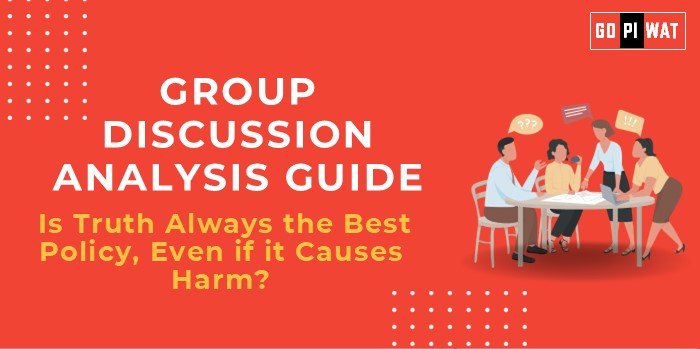📋 Group Discussion (GD) Analysis Guide: Is truth always the best policy, even if it causes harm?
🌐 Introduction to the Topic
Truth as a cornerstone of ethics sparks profound debate, especially when its revelation could lead to harm. This dilemma resonates across personal, professional, and societal contexts, making it a vital topic for ethical and philosophical discourse.
Topic Background: The principle of “truth is the best policy” is rooted in moral philosophy, with proponents like Kant emphasizing its universal value. However, the pragmatic implications of harmful truths challenge its absolutism, especially in scenarios like whistleblowing, diplomacy, or interpersonal relationships.
📊 Quick Facts and Key Statistics
- 💬 Trust in Honesty: 71% of people value honesty highly in personal and professional settings (2023, Gallup).
- 🧠 Psychological Impact: Withholding harmful truths leads to emotional distress in 64% of individuals (APA, 2022).
- 📉 Whistleblowing Cases: Truth revelation increased corporate accountability by 15%, though causing reputational and financial damage to implicated companies (OECD, 2023).
👥 Stakeholders and Their Roles
- 📌 Individuals: Weigh personal ethics against potential harm as truth-tellers or recipients.
- 🏢 Organizations: Navigate transparency vs. reputational interests dilemmas.
- 🌍 Governments: Balance national security concerns with public transparency.
- 👨👩👧👦 Society at Large: Experiences long-term benefits of truth despite short-term harm.
✔️ Achievements and Challenges
Achievements
- Transparency movements like the Right to Information Acts.
- Corporate whistleblowing successes, e.g., Enron revelations leading to reforms.
- Diplomatic wins like post-Cold War reconciliation efforts.
Challenges
- Ethical dilemmas: Harmful truths eroding trust or relationships.
- Legal repercussions: Whistleblowers facing retaliation despite ethical justification.
- Cultural variations: Norms around truth differ globally, complicating universal applications.
Global Comparisons:
- 🇺🇸 USA: Whistleblower Protection Act provides safeguards but limits full immunity.
- 🇸🇪 Scandinavia: Cultural prioritization of transparency strengthens societal trust.
📂 Structured Arguments for Discussion
- 👍 Supporting Stance: “Truth fosters long-term trust and accountability, even at a short-term cost.”
- 👎 Opposing Stance: “Revealing harmful truths can destabilize relationships, institutions, or societies.”
- ⚖️ Balanced Perspective: “Truth is ideal but must be contextualized to minimize undue harm.”
💡 Effective Discussion Approaches
- 📜 Opening Approaches:
- Philosophical query: “If truth is universally good, how do we justify its harm in sensitive cases?”
- Case study: Discuss Edward Snowden’s revelations or ethical dilemmas in medical diagnoses.
- 🔄 Counter-Argument Handling:
- Acknowledge impact: “Yes, harmful truths can destabilize, but…”
- Present alternatives: “Truth delivered with empathy can mitigate harm.”
🛠️ Strategic Analysis of Strengths and Weaknesses
- ✔️ Strengths: Builds trust and credibility, encourages accountability.
- ⚠️ Weaknesses: May lead to emotional or societal harm, context-dependent.
- 🌍 Opportunities: Promotes ethical leadership, advances transparency in governance.
- 🚨 Threats: Misuse of truth for personal agendas, potential societal backlash.
🏫 Connecting with B-School Applications
- 💼 Real-World Applications: Ethical decision-making in organizational behavior and leadership.
- ❓ Sample Interview Questions:
- “Can truth always align with leadership ethics?”
- “Share an example where revealing the truth proved costly but necessary.”
- 📘 Insights for Students: Ethical leadership hinges on balancing transparency with sensitivity, a key skill for navigating dilemmas.


